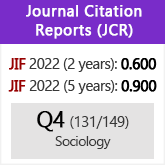Social Change and 'Modern Constitution' in the Classics of Sociology. Durkheim and Weber in Comparative Perspective
DOI:
https://doi.org/10.3989/ris.2009.05.22Keywords:
History, Bruno Latour, Modern Critique, Modernity, ReligionAbstract
The aim of this article is to analyse the conception of social change of Durkheim and Weber from a comparative perspective. It proposes a reading of their works attending to the place these authors occupy in what, following Bruno Latour, may be named as “Modern Constitution”. From this metatheoretical level, the comparison brings to light the tools and resources of the “Modern Critique” which they utilise to build their theories of social change. From this comparative perspective, the article examines how Durkheim and Weber theorize on the “fourth guarantee” of the “Modern Constitution”, that refers to God’s presence in modernity. Finally, this “guarantee” is problematized in the frame of the contemporary society attending to current theories.
Downloads
References
Bourdieu, P. 1987. “Legitimation and Structured Interests in Weber’s Sociology of Religion.” Pp. 119-136 in Max Weber. Rationality and modernity, edited by Whimster, S. and S. Lash. London: Allen & Unwin.
Callejo, J. 1998. “Cien años después: los rasgos de modernidad de El Suicidio.” Revista Española de Investigaciones Sociológicas 81:73-98. doi:10.2307/40183965
Douglas, M. 1996. Cómo piensan las instituciones. Madrid: Alianza.
Durkheim, E. 1982. Las formas elementales de la vida religiosa. Madrid: Akal.
Giner, S. 2003. Carisma y razón. La estructura moral de la sociedad moderna. Madrid: Alianza.
González García, J. M. 1992. Las huellas de Fausto. Madrid: Tecnos.
Habermas, J. 1987. Teoría de la acción comunicativa (Tomo I). Madrid: Taurus.
Jameson, F. 1974. “The vanishing mediator: narrative structure in Max Weber.” New German Critique 1:52-89.
Lamo De Espinosa, E. 1996. Sociedades de cultura y sociedades de ciencia. Oviedo: Nobel.
Latour, B. 1993. Nunca hemos sido modernos. Madrid: Debate.
Luhmann, N. 1990. “Society, Meaning and Religion-Based on Self-Reference”, en Essays on self-reference, Nueva York, Columbia University Press. pp. 144-164.
Lukes, S. 1984. Émile Durkheim. Su vida y su obra. Madrid: CIS.
Mommsen, J. 1981. Max Weber. Sociedad, política e historia. Buenos Aires: Alfa.
Parsons, T. 1968. La estructura de la acción social. Madrid: Guadarrama.
Prades, J. 1998. Lo sagrado. Barcelona: Península.
Ramos, R. 1999. La sociología de Émile Durkheim. Patología social, tiempo y religión. Madrid: CIS.
Ramos, R. 2001. “La ciudad en la historia: comparación, análisis y narración en la sociología histórica de Max Weber.” Política y Sociedad 38:45-67.
Rodríguez, J. 1995. “Las categorías de lo histórico en la sociología de Max Weber.” Política y Sociedad 18:45-67.
Stark, W. 1971. “Max Weber y la heterogonía de los fines.” Pp. 191-208 en Presencia de Max Weber, editado por Parsons, T. et al. Buenos Aires: Nueva Visión.
Weber, M. 1944. Economía y Sociedad. México: FCE.
Weber, M. 1967. El político y el científico. Madrid: Alianza.
Weber, M. 1991. La ética protestante y el espíritu del capitalismo. Barcelona: Península.
Downloads
Published
How to Cite
Issue
Section
License
Copyright (c) 2011 Consejo Superior de Investigaciones Científicas (CSIC)

This work is licensed under a Creative Commons Attribution 4.0 International License.
© CSIC. Manuscripts published in both the printed and online versions of this Journal are the property of Consejo Superior de Investigaciones Científicas, and quoting this source is a requirement for any partial or full reproduction.All contents of this electronic edition, except where otherwise noted, are distributed under a “Creative Commons Attribution 4.0 International” (CC BY 4.0) License. You may read here the basic information and the legal text of the license. The indication of the CC BY 4.0 License must be expressly stated in this way when necessary.
Self-archiving in repositories, personal webpages or similar, of any version other than the published by the Editor, is not allowed.

















